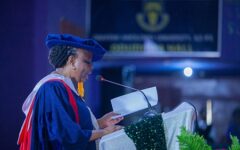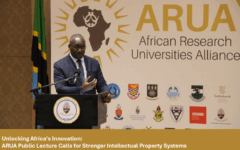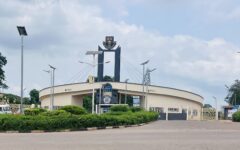OAU EEE Department Holds “AI Fest” Exhibition and Commissions AI Studio
March 21, 2022 2022-11-17 6:03OAU EEE Department Holds “AI Fest” Exhibition and Commissions AI Studio
The first “OAU AI Fest” exhibition of the Department of Electronic and Electrical Engineering will hold at 10 am on Tuesday 22nd March, 2022. According to the organizers of the event, the goals of the OAU AI Fest are to inform and to inspire. With respect to the first goal, the exhibition will provide an opportunity for research groups to exhibit ongoing projects in which AI is being used to solve real-life problems. Projects already billed to feature in the exhibition include innovative work on stroke neurorehabilitation and novel medical devices. There are also projects in which drones are being used along with computer vision for surveillance and crop monitoring among others. The organizers note that few people on campus are aware of these ongoing projects, even though some of them are groundbreaking. In particular, the OAU Platform for Upper Limb Stroke Rehabilitation is currently the only indigenous rehabilitation robot of note in Africa, serving as the continent’s only flagbearer in the International Consortium for Rehabilitation Robotics. The AI Fest will provide a vehicle to inform members of the community about ongoing AI-related research such as this. The event organizers hope that this will in turn inspire even more researchers and students to apply AI in their work, since AI remains a relatively fertile ground on which Nigeria can plant the seeds of a vision to reach the forefront of the global technology space.
The exhibition will coincide with the commissioning of the Alumni AI Studio of the Department of Electronic and Electrical Engineering. The Studio is the brainchild of the Applied Artificial Intelligence and Robotics Research group of the department. Due to severe space constraints, the department has hitherto been unable to provide her students with a befitting workspace within which to conduct AI-related research. This has greatly limited such student and research assistants. An idea was pitched to some alumni and friends of the department to create a model workspace to address this problem. The goal of the AI Studio is to allow selected students to work in an environment somewhat similar to what obtains in North American universities. Free Internet access and 24/7 electricity are guaranteed to students working in the Studio. Furthermore, an increasing number of them will be placed on stipends to ease financial pressures. Teleconferencing facilities have also been put in place so that alumni can directly call in and interact with Studio students from time to time through a 60-inch LED screen. Maker facilities such as a 3D printer are already in place, as is a workstation with two Nvidia RTX 8000 Quadro graphical processing units, capable of over 260 TFLOPS of machine learning performance, graciously donated by NVIDIA Corporation of Santa Clara, California
The AI Studio will greatly complement the B.Sc. curriculum of the department, which a spokesperson described as one of the most innovative in Nigeria in terms of helping students to link theory and real-life problem-solving. Partly as a result of having half-a-dozen members of staff trained in curriculum development at the prestigious Massachusetts Institute of Technology through the MIT-Total-NNPC Empowering the Teachers Fellowship (anchored by Prof. A.I. Akinwande), the B.Sc. curriculum has real-life problem-solving components at all levels. Starting with a course in their first year which uses self-paced projects to give students a bird’s eye view of electrical engineering and preview of important concepts, students work in teams in “Group Design” project courses in their second, third and fourth years, before they wrap up with an individual capstone project in their final year. In addition, a course titled “Startups for Electrical Engineers” in their third year will introduce students to important principles of entrepreneurship, using their Group Design projects as focal points. To tie all these together, every student in the department is assigned to a research group from their third year, in which they will remain and contribute till graduation. Suitable workspaces for students undertaking these project courses have always been a constraint, which is why the AI Studio is so crucial.
The department hopes that the Studio can serve as a proof of concept, and that other alumni and partners will help fund the creation of even more workspaces and complementary initiatives. Already, a group of alumni have announced a complementary Innovation Prize competition with cash prizes totaling seven million naira per year. The current studio has a capacity of 20 students, which is a small fraction of the total student population of 700, making even more workspaces a key need. According to a spokesperson, the Studio also needs additional support to provide a solar-powered energy backup system, to replace the current petrol generator, which is noisy and not environmentally-friendly.





